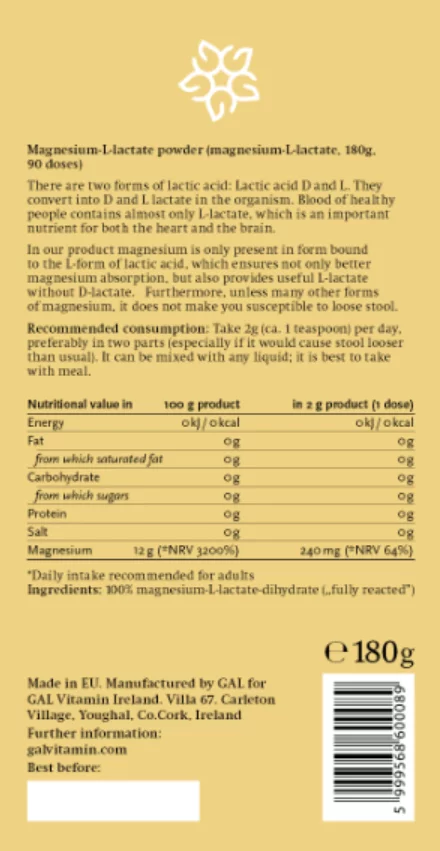
Magnesium is a rather important mineral, the required quantity of which is difficult to intake solely by nutrition. Stress, sports, food with high phytic acid content (seeds, wholegrain cereals, brains, etc.), as well as coffee and tea consumption, may speed up the clearance of magnesium from the body. As a result, magnesium deficit is a general phenomenon. Magnesium supplementation is important to everyone. Life Extension Foundation calls magnesium the “new vitamin D3”, because it is just as important, and its deficit is just as frequent, as that of D3. Absorption of magnesium preparations, however, is highly variable, and to most people, it causes diarrhoea, loose stools or other digestion problems, which - among others - may be the result of magnesium binding stomach acid, although low stomach acid production is a general problem. (Reflux is, in fact not a gastric hyperacidity, on the contrary, quite often it is caused by the low stomach acid level. Stomach acid flows back to the oesophagus because of the existing SIBO and/or non-functioning cardia, and it makes seem as if there were too much stomach acid, even when in fact there is too little.)
Inorganic forms of magnesium such as -sulfate, -oxide, -carbonate, -hydroxide are hardly utilized, but in turn, they may cause loose stools or diarrhoea, and they bind stomach acid. (Not absorbed magnesium causes, for example, diarrhoea, so it is not surprising that the consumption of inefficiently utilized magnesium types may cause diarrhoea and other intestinal problems.) The only inorganic magnesium type with a relatively good level of utilization is chloride, which does not bind stomach acid, just the opposite, it helps its production.
Most organic versions of magnesium (with chelate-bound) are well-absorbing and s such, they are less prone to cause diarrhoea/loose stools/intestinal problems. The exception is magnesium citrate, which is a magnesium salt formed with citric acid, and too much citric acid is a priori prone to cause loose stools. Magnesium citrate contains 15-16 per cent elementary Mg, and more than 80 per cent citric acid. Although it is indeed well absorbed in small quantities, the required quantity still causes diarrhoea or loose stools for most people. In this case, however, it is not absorbed (in fact, it sprouts from the body other useful things, as well, as loose stools are caused by the fact that minerals were not sufficiently sucked back in the colon).
Our product, the magnesium L lactate is the salt of magnesium formed with lactic acid, namely with L lactic acid and not with D or DL lactic acid. This is relevant, because L lactic acid gets to the bloodstream as L lactate, which is - among others - the preferred fuel for the brain and for the heart, meaning that if there is sufficient L-lactate in the blood, then the heart and brain cells will prefer the L-lactate instead of glucose (or ketone bodies). However, there is typically little L-lactate in our body (its level is the highest during and after sports activities, this is one of the reasons we feel so good after exercise). D lactate, in turn, is not a nutrient to our body, and a healthy organism is characterized by its low level (its high level can be caused by stress, metabolic diseases or even an upset intestinal flora).
So besides its magnesium content, an additional advantage of magnesium L-lactate is it ensures a beneficial form of lactic acid/lactate. Besides being a well-utilized form of magnesium, and its laxative impact (causing diarrhoea) is little typical for it, another significant benefit is that it is economical. Based on the price of one unit of elementary magnesium, it is the most favourable one. It tastes relatively neutral, so it can be mixed with almost any drink.
Dosage: Although the label on the product suggests 2g per day - which is equal to 240 to 250 mg of elementary magnesium, it is worth taking more than that, if our diet does not include too many molluscs, venison or pumpkin. Even 3 to 4g per day can be useful. Take no more than 1g, a maximum of 2g at a time.
12 to 13 per cent of magnesium L-lactate is elementary magnesium, which means that each gram supplies to the body 125mg of well-utilized elementary magnesium.
Most magnesium products contain deliberately misleading information! Most of the organic (chelate-bound) magnesium preparations available on the market aren’t in fact what their product labels say they are. Most people use activated magnesium compounds that are only party-reacted or not reacted at all. This means for example that the product label says that it contains magnesium malate, when in fact it only contains a mix of magnesium oxide or carbonate and malic acid. Or instead of magnesium citrate, the product contains only a mix of magnesium oxide and citric acid.
It is possible that the reaction partly took place, but most of the contained magnesium is not in the form indicated on the label! This is the reason, why even organic forms so often cause diarrhoea because they in fact only partly contain the indicated form. Not “fully reacted” versions always contain more elementary magnesium, plus the ingredients are less expensive, so they are significantly more economic.
Many incompetent manufacturers do not even know that there are differences between the various magnesium compounds with the same name, so they will naturally select the cheaper ones, which on top of everything have higher magnesium content. How can one make sure that the selected product is good? It is difficult, for sure, but here is a little help; I’ll give you the list of percentages of elementary magnesium contents of “fully reacted” versions of the most common organic magnesium forms.
- Magnesium malate: 6 – 12% (the (mono-) magnesium malate is the real one,di-magnesium malate is not fully reacted!)
- Magnesium bisglycinate: 12 – 14%
- Magnesium citrate: 14 – 16%
- Magnesium ascorbate: 6 – 17%
- Magnesium-L lactate: 12 - 13%
The weight of 1 pill/capsule must not exceed 1000mg, also including the capsule shell and the excipients. This means that if we read on a product labelled as Mg malate that it contains 200mg magnesium per capsule/tablet, then we already know that it is not Mg malate, as the elementary magnesium content of Mg malate may not exceed 12 per cent, i.e. 1 capsule/tablet must not contain more than 120mg, but probably less. So we should measure one capsule/tablet, for example on jewelry scales, and take the percentage of the weight identified in the previous list. The actual magnesium content can only be below it if it actually contains the indicated compound. However, this is not a guarantee, either, as there are magnesium compounds that are not “fully reacted”, but contain the same amount of magnesium than the “fully reacted” compounds. Another problem is that the indication of magnesium content on many products is misleading or false because the compound itself is indicated as magnesium, although elementary magnesium is only a small fragment of it, as can be seen from the percentages indicated above.
We, of course, use only “fully reacted” version of everything, including magnesium.
Brief summary of the beneficial effects of magnesium:
Improvement of muscle work/sports performance, prevention of muscle cramps, boosting muscle regeneration, boosting the immune system, prevention of cardiovascular problems, activity against calcification (calcium deposits), supporting heart muscles, significant contra-stress effect, better sleeping, clearer thinking, more energetic days.
Who should select the L lactate form of magnesium? Those, who want to get access to high-quality magnesium in the most economical way, but do not want to make compromises in terms of taste or absorption. So, we recommend it for everyone, who wants “only” magnesium, and one of the best versions of it.
Made in the EU
Warnings
KEEP OUT OF REACH OF CHILDREN. DO NOT EXCEED RECOMMENDED DOSE.
If you are undergoing treatment for a medical condition or if you are pregnant or lactating, please consult your medical practitioner before introducing supplementary foods to your normal routine. The dietary supplement should not be used as a substitute for a varied and balanced diet or a healthy lifestyle. Store tightly closed in a cool and dry place.
References:
1. Examine.com
2. Clasado.com/research/

-Allergen-free
- Glutenfree
- Egg-free
- Soy allergen-free
- Dairy and lactose-free
- Free of sulfur dioxide
- Sugar-free
- GMO-free
- Vegetarian
- Vegan
- FSC paper material (CO31340)
- Packaging from carbon-neutral production
- 100% recyclable packaging
Green: The product has the described property
Red: The product does not have the described property

Brief and precise summary of Magnesium
Magnesium is an essential mineral substance that can be found in the body in large quantities. More than 600 enzymes’ functions depend on it. It has an important role in the metabolism of glucose, protein synthesis, and the proper functioning of muscles and the nervous system. While magnesium can be found in various foods, magnesium deficiency is still common. Surveys conducted in the USA show that nearly half of the population doesn’t reach the necessary daily intake, as processed food all but lacks magnesium.
The protective role of Magnesium in the development of depression
Depression is a serious mood disorder that unfortunately affects millions of people worldwide. It is not an occasional foul mood, but a condition that lasts months, or even years, and makes life tremendously difficult. There are several types of depression, which are usually treated with medication, unfortunately often without success.
Magnesium is a great sleep aid for the elderly
Sleep is one of the pillars of health, without which the body cannot function properly. Various sleep disorders, such as insomnia, affect a great many people, especially the elderly.
The effect of magnesium supplementation on bone health
When healthy bones are mentioned, most people will think of calcium, as its benefits have been highlighted for decades. While calcium is indeed important for bone health, calcium deficiency is relatively rare if one’s vitamin D levels are adequate. Another mineral substance, however, is much more often lacking magnesium, which not nearly enough people ingest, according to surveys.
Magnesium: An important mineral for blood sugar control
Unfortunately, the prevalence of metabolic syndrome, type 2 diabetes, and the insulin resistance associated with both is increasing rapidly around the world. The main reason for this is our modern lifestyle: apart from our circadian rhythm, the biggest change in recent decades has been in our diet. Not only has our caloric intake increased dramatically with the rise of industrialized foods, but at the same time, we are deprived of many important micronutrients.
Magnesium is as effective as drugs in treating migraine
Migraine is a nuisance to many, with no known cure. Symptoms are typically alleviated by anti-inflammatory medicines and painkillers. An increasing number of researchers are trying to find alternative treatment options. There’s more focus on vitamins and minerals, which are not only cost-effective solutions but safe for long-term use as well.









